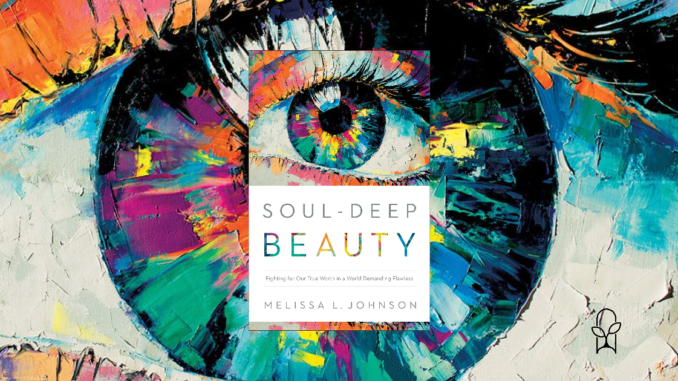
Published by Bethany House Publishers on June 6, 2023
Genres: Non-Fiction, Christian Life
Buy on Amazon
Goodreads

We Are Being Lied To
It's time to get honest with ourselves. Culture's beauty standards are messed up. We all know it, and we all think we can resist the pull to look a certain way. Yet most of us--our daughters and nieces too--still strive for a broken kind of beauty and feel I'm. not. good. enough.
For Melissa Johnson, a marriage and family therapist, this lie eventually led to battling an eating disorder. Through that experience, she saw that chasing broken beauty breaks women in so many ways. She also realized that true, soul-deep beauty is not impossible--it abounds in us and all around us. And now Melissa's on a mission to help you
· uncover the hidden damage cultural lies about beauty have on your mind and soul
· reconnect with God, in whose image you are made
· walk away from shame and striving
· love yourself--and others--unconditionallyTrue beauty is the fullness of life we are longing for. It's the reality that blows our minds, affirms our true worth, and invites us into an adventure that meets our deepest longings. And it's true beauty that will save us if we open our eyes to it.
"Nothing is more shattered or more misunderstood in our lives than beauty. On our own, we are unable to recapture God's vision for it, and every generation needs guides who can reintroduce it to us again for the first time. In Melissa Johnson, we have such a guide."--CURT THOMPSON, MD, author of The Soul of Desire and The Soul of Shame
Melissa L. Johnson writes about the harmful effects of modern American beauty standards, sharing sobering statistics, her personal story of overcoming anorexia, and encouragement for other women dealing with shame and feelings of inadequacy. She writes about how even though she wanted to do everything right and take care of herself, her goal to be healthy morphed into an increasingly obsessive focus on minimizing food and maximizing exercise. Johnson reflects on how difficult it was for her to accept that she had a problem and needed help, and she shares stories and insights from her healing process and recovery journey. Then she focuses on ways that women can uplift themselves and others by rejecting harmful social scripts, honoring their bodies for the miracles that they are, and finding their true selves. There are also discussion questions and healing practices suggested at the end.
Soul-Deep Beauty: Fighting for Our True Worth in a World Demanding Flawless will help and encourage many women. The author’s vulnerability about her personal journey will encourage women who have dealt with similar things, and her research and insight into beauty standards and predatory advertising will be eye-opening for some. Personally, I felt that Johnson overstated how revolutionary the topic is, since I’ve spent all my life hearing that Hollywood and advertising images are incredibly unrealistic, and that advertisers deliberately magnify women’s insecurities to sell more appearance-related products and services. Johnson also makes body image struggles sound way more gendered than they are, making lots of sweeping statements about girls and women with only a few cursory references to men and boys.
She acknowledges that people of any background and gender can suffer from eating disorders, but her near-exclusive focus on women can distort her readers’ understanding of the issue. Over recent decades, men and boys have increasingly struggled with body image problems and disordered food and exercise habits, since the entertainment and advertising industries deeply objectify them as well and have preyed on them as an untapped market. A broader look at suffering humans, rather than just suffering women, would have made this book stronger. Nonetheless, I am sure that many women will find Johnson’s reflections very eye-opening and helpful, and she shares wise advice for how women can honor and respect themselves and others.
Johnson connects body image issues with themes about shame and brokenness from the Bible and Christian theology. She mostly skirts any discussion of confession and repentance, and I wish that she had written about the healing that people can experience by repenting of sin when it’s appropriate, receiving God’s forgiveness for ways that they have harmed themselves and others. I’m not sure if Johnson’s approach reflects a different theology than mine, or if she just thought those themes were a given in Christian circles and wanted to highlight other things. Either way, the Christian elements felt incomplete to me, but I appreciated Johnson’s helpful reflections about healing shame through connection and belonging. She also has great insights about how women can discover God’s purpose for their lives when they break free from impossible striving towards beauty ideals and have time and mental energy for better pursuits.
Soul-Deep Beauty will appeal to many women who are struggling with body shame, especially if their experiences are similar to the author’s. Johnson’s eloquent writing about rejecting false beauty standards, embracing embodiment, and banishing shame will help and encourage many women, and even though I wish that she had included some additional important themes and reflections, this book will encourage and help many women and girls who want to reconsider their relationships with their bodies and heal from shame.
